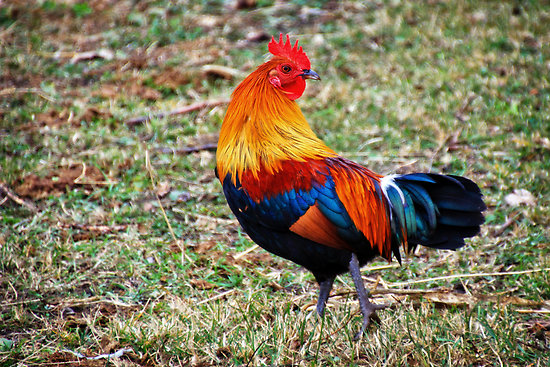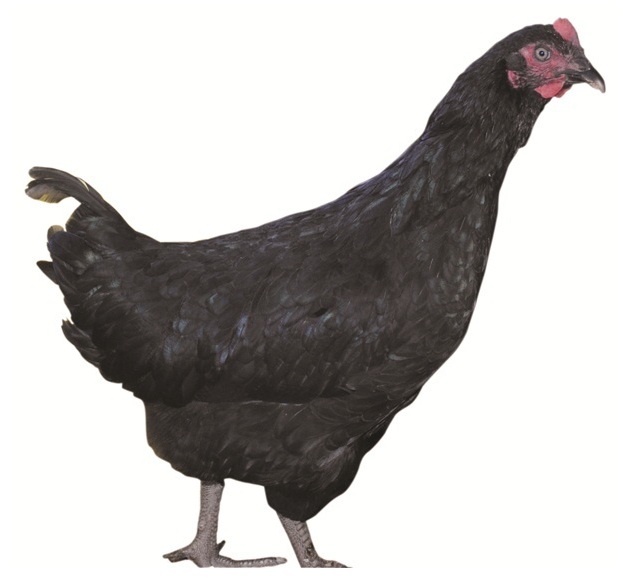Other Dual Purpose Chickens
For people who are always on the lookout for the best of both worlds, there is always the option for dual purpose chicken breeds. These chicken breeds can be used for laying purposes and later be used for meat birds.
If you want to get the most for your money and have chickens that allow for ample breeding, these breeds should be high up on your list. After all, the best way to replenish your stock of meat chickens is naturally.
1. Brown Leghorn
The variant of Brown Leghorn, White Leghorn is one of the best egg layers. They can lay up to 280 eggs per year. But don’t be confused, there’s no actual difference between the brown and white ones (other than their feather colors, of course). And they both lay white eggs.
The Brown Leghorn is an active forager that loves hot climates. They are rarely aggressive, but at times, the males can be a bit grouchy.
| Weight (male) | 6 lbs |
| Weight (female) | 5 lbs |
| Harvest time | 16-21 weeks |
| Egg production (annual) | 280 |
| Pros & cons | Forager
Great personality Good layer & decent meat |
| Variants | White, red, buff, brown, black
Single comb, rose comb |
2. Egyptian Fayoumi

They are also known to mature very early in life, which means they can lay a lot of eggs before it is time for them to land on the dinner table.
| Weight (male) | 5 lbs |
| Weight (female) | 4 lbs |
| Harvest time | 14-18 weeks |
| Egg production (annual) | 150 |
| Pros & cons | Fast growth
Taste great (both the eggs and meat) Flighty |
| Variants | Silver |
3. Turken (Naked Neck)

This bird loves hot and cold weather alike, which means that you can keep them as backyard meat birds in any part of the country. They are extremely adaptable to any situation, which means that they will be less prone to stress, and put on weight easily.
These birds are very active layers and can be great mothers.
| Weight (male) | 6 lbs |
| Weight (female) | 4 lbs |
| Harvest time | 11-18 weeks |
| Egg production (annual) | 104 |
| Pros & cons | Easy to keep
Decent egg and meat production |
| Variants | Red, blue, cuckoo, buff, black, white |
4. Buckeye

These birds love cold climates. They are extremely adaptable, disease resistant and fairly docile. The males can grow to be a bit moody toward small animals and cats.
Since they love cold climates, they are great for people who live in the northern portion of the United States.
For people in colder climates who typically expect their population to dwindle in the winter, the consistent breeding habits are a welcome experience.
| Weight (male) | 9 lbs |
| Weight (female) | 6.5 lbs |
| Harvest time | 16-21 weeks |
| Egg production (annual) | 200 |
| Pros & cons | Excellent dual purpose
Cold weather resistance |
| Variants | Mahogany red |
5. Chantecler

The breed, in general, is very docile and matures extremely early. This means that they begin laying eggs early and they mature to the point of slaughter early as well. This breed is great for a free range, because they like to forage along with their feed.
| Weight (male) | 9 lbs |
| Weight (female) | 7 lbs |
| Harvest time | 11-16 weeks |
| Egg production (annual) | 200 |
| Pros & cons | Fast growth
Great for free range |
| Variants | Partridge, white |
No matter what breed of chicken you decide to raise in your backyard, eating healthy and living healthy should be the motto of everyone in this fast-paced world.
6. The KARI Improved Kienyeji Chicken
This is by far the most popular of the chicken breeds in Kenya and it has some admirable characteristics. The KARI Improved Kienyeji Chicken produces more meat as well as more eggs than the local indigenous poultry breeds. It is also a highly adaptable bird and will do well even in areas with harsh climatic conditions such as the arid and the semi-arid areas in Kenya.
KARI Improved kienyeji chicken can be reared in both free range as well as the semi-free range systems. These are typically called the semi-intensive systems. It is a good breed for those farmers who want to rear their chicken in a completely free range or organic way without commercial feeding or hormones.
With proper management, the KARI Improved Kienyeji chicken is also a great breed for eggs. Farmers can look forward to anywhere between 220 to 280 eggs per year. Within five months, the KARI hen will have attained 1.5Kgs while a cock will weigh 2Kgs within the same duration of time if it is fed well. The KARI improved kienyeji chicken farming has a quiet temperament as well as great feathering. Compared to other breeds in the market, it will adapt very fast to the conditions in which it is kept.
How to Fatten Your Meat Chickens the Right Way
If you are going to raise any of the meat chickens on this list, feeding them according to their dietary needs is essential to getting them in the freezer at the perfect time.
All of the meat chickens in this article have dietary needs that are similar in nature.
In order to ensure that your chickens yield the proper amount of meat to fat ratio, you will want to feed them on a 12/12 hour schedule. This means that food should be readily accessible for 12 hours per day, and completely absent for the other 12 hours.
The water should be placed on the opposite side of the pen from the chicken’s food. This ensures that they exercise enough to create lean muscle, instead of fat. If given the chance, chickens can be extremely lazy.
They also thrive on food and water.
This means that if they do not have to work to get from the food to the water, they will not get the minimum amount of exercise necessary to create the lean muscle that creates the ideal taste and texture that you are looking for on your dinner table.
N/B: Some of these breeds are not locally available in Kenya hence if you want to rare them you’ll have to incur importation costs.












